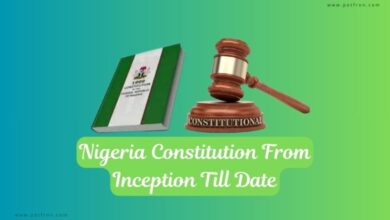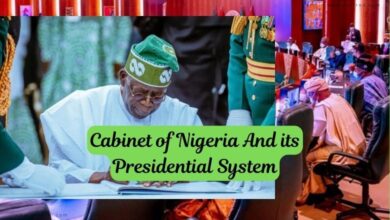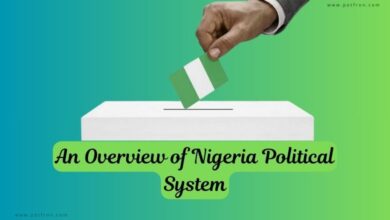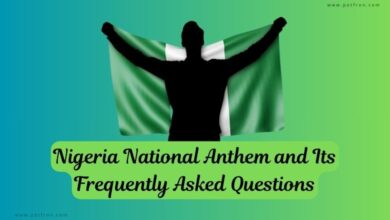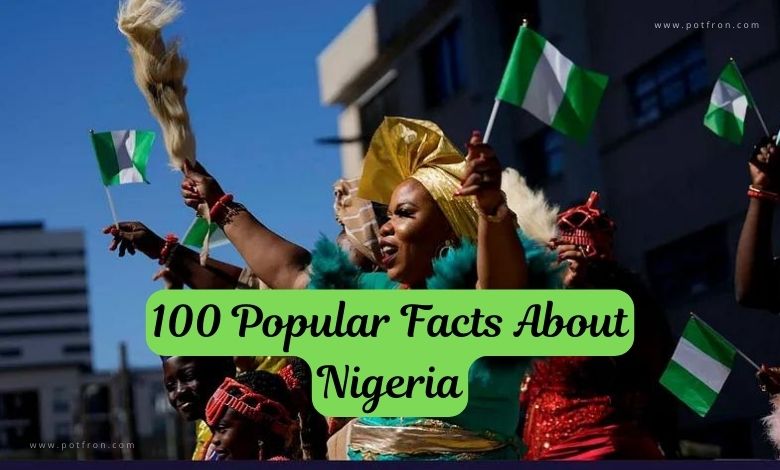
Do you know any fact about Nigeria? Nigeria is country located in West Africa, with over 220 million people. It is the most populous continent in africa and most populous black nation in the world. It is a federal republic made up of 36 states, with Abuja as its capital and Lagos as its largest city. Known for its rich cultural diversity, Nigeria is home to over 250 ethnic groups, including the Hausa-Fulani, Yoruba, and Igbo.
Suggested: An Overview of Nigeria Political System
Related: Nigeria National Anthem and Its Frequently Asked Questions
100 known Facts About Nigeria
General Facts About Nigeria:
- Official Name: Federal Republic of Nigeria.
- Location: Nigeria is in West Africa.
- Capital: Abuja.
- Largest City: Lagos is the largest city by population but smallest city by land mass in Nigeria.
- Independence: Nigeria gained independence from the United Kingdom on October 1, 1960.
- Population: Nigeria has the largest population in Africa, with over 220 million people.
- Ethnic Groups: There are over 250 ethnic groups in Nigeria, with the largest being Hausa-Fulani, Yoruba, and Igbo.
- Official Language: English.
- Currency: Nigerian Naira (₦).
- Time Zone: West Africa Time (UTC+1).
Geography:
- Borders: Nigeria shares borders with Benin, Niger, Chad, and Cameroon.
- Climate: Nigeria has a tropical climate with a wet and dry season.
- Niger River: The Niger River is the largest river in Nigeria and the third longest in Africa.
- Benue River: A major tributary of the Niger River.
- Highest Point: Chappal Waddi (2,419 meters) is located in the eastern part of Nigeria.
- Nigeria has a coastline along the Atlantic Ocean (Gulf of Guinea).
- Natural Resources: Nigeria is rich in oil, natural gas, tin, iron ore, limestone, and coal.
- Largest Wetland: The Niger Delta is one of the largest wetlands in the world.
- Sokoto Caliphate: One of the most prominent empires in pre-colonial Nigeria, based in the north.
- Jos Plateau: is known for its rich mineral deposits.
Related: List of Nigeria Past Presidents
Historical Facts About Nigeria / Facts about Nigeria History:
- First Republic: Nigeria became a republic in 1963.
- Biafran War: happened between 1967 and 1970 over the secession of the southeastern region (Biafra).
- Colonial History: Nigeria was colonized by the British in the late 19th century.
- Slave Trade: Nigeria was heavily involved in the transatlantic slave trade, especially in the coastal regions.
- Benin Empire: is one of the most powerful West African kingdoms is located in modern-day southern Nigeria.
- Oyo Empire: is a Yoruba empire that dominated southwestern Nigeria.
- Nok Culture: The Nok civilization (500 BC – 200 AD) is one of the oldest in Nigeria, known for its terracotta sculptures.
- First Military Coup: Took place in 1966, leading to years of military rule.
- Return to Democracy: Nigeria returned to civilian rule in 1999.
- First President: Dr. Nnamdi Azikiwe was Nigeria’s first president.
Politics & Governance:
- Federal System: Nigeria is a federal republic with 36 states.
- Current President: As of 2024, Bola Tinubu is the President of Nigeria.
- Political Structure: Nigeria operates a presidential system of government.
- National Assembly: Nigeria’s legislative arm consists of the Senate and House of Representatives.
- Nigerian Civil Service: Plays a significant role in governance.
- Constitution: Nigeria’s current constitution was adopted in 1999.
- Democratic Governance: Nigeria has had uninterrupted democratic governance since 1999.
- Political Parties: The two dominant political parties are the All Progressives Congress (APC) and the People’s Democratic Party (PDP).
- Local Government Areas: Nigeria is subdivided into 774 local government areas (LGAs).
- Corruption: Nigeria has struggled with corruption, particularly in politics and public administration.
Nigeria Economic Facts:
- Largest Economy in Africa: Nigeria has the largest GDP in Africa, largely due to oil and gas.
- Crude Oil Exporter: Nigeria is one of the largest oil producers in the world.
- Agriculture: Despite oil, agriculture employs a significant part of the population, with crops like yams, cassava, and cocoa.
- Services Sector: Nigeria’s services sector is growing, especially in telecommunications and banking.
- Nollywood: Nigeria’s film industry, Nollywood, is one of the largest in the world.
- Telecommunications: Nigeria is one of the largest telecom markets in Africa.
- Informal Economy: A large part of Nigeria’s economy operates informally, with many small traders.
- Stock Exchange: The Nigerian Stock Exchange (NSE) is one of the largest in Africa.
- Microfinance: Microfinance banking is an important part of the Nigerian financial system.
- Technology Sector: Nigeria’s tech sector is growing rapidly, with Lagos being a hub for startups.
Related: Nigeria Coat of Arms And its Full Meaning
Cultural Facts About Nigeria:
- Music: Nigeria is known for Afrobeats, a popular genre created by artists like Fela Kuti
- Traditional Dance: Different ethnic groups have unique traditional dances, such as the Yoruba Bata and the Igbo Atilogwu.
- Literature: Wole Soyinka is the only Nigerian Nobel Prize winner and he won the Nobel Prize in Literature in 1986.
- Festivals: Major cultural festivals include the Lagos Carnival, Eyo Festival, and Osun-Osogbo Festival.
- Languages: Besides English, Nigeria’s major languages include Hausa, Yoruba, and Igbo.
- Nigerian Cuisine: Popular dishes include jollof rice, pounded yam, suya, egusi soup, and akara.
- Traditional Clothing: Nigerian traditional attire includes the Yoruba agbada, Hausa kaftan, and Igbo isiagu.
- Religion: Nigeria is roughly split between Islam (mostly in the north) and Christianity (mostly in the south).
- National Football Team: Known as the Super Eagles, Nigeria has won the Africa Cup of Nations three times.
- Nigerian Pidgin: is a creole language commonly spoken across the country.
Education Fact About Nigeria:
- First University: University of Ibadan, established in 1948.
- Education System: Nigeria follows the 6-3-3-4 system (6 years primary, 3 years junior secondary, 3 years senior secondary, 4 years tertiary).
- Illiteracy Rate: Literacy rates have improved, but challenges remain, especially in rural areas.
- JAMB: The Joint Admissions and Matriculation Board (JAMB) conducts entrance exams for higher institutions.
- NYSC: Nigerian graduates are required to serve one year in the National Youth Service Corps (NYSC).
- Almajiri System: A traditional system of Islamic education in northern Nigeria.
Sports:
- Football: is the most popular sport in Nigeria.
- Olympics: Nigeria has won several Olympic medals, particularly in athletics and football.
- Basketball: Nigeria’s men’s and women’s basketball teams are among the top in Africa.
- Wrestling: Traditional wrestling is popular, especially in the northern part of the country.
- Chinua Achebe: is one of Nigeria’s greatest literary figures, known for his novel Things Fall Apart.
- Anthony Joshua: is a Nigerian-British boxer and former world heavyweight champion.
- Tennis: Table tennis is a popular indoor sport in Nigeria.
Religion:
- Religious Diversity: Nigeria is religiously diverse, with both Islam and Christianity widely practiced.
- Traditional Religions: Many Nigerians also practice traditional African religions.
- Prominent Churches: Nigeria has large Pentecostal churches like Redeemed Christian Church of God (RCCG) and Winners Chapel.
- Islamic Centers: Prominent Islamic institutions include the Sultan of Sokoto’s court and various mosques across the north.
- Religious Festivals: Christmas, Eid al-Fitr, and Eid al-Adha are major religious celebrations.
Technology & Innovation Facts About Nigeria:
- Fintech: Nigeria has a booming fintech industry, with companies like Paystack and Flutterwave leading innovation.
- Space Program: Nigeria has a space agency, NASRDA, and has launched several satellites.
- Tech Startups: Lagos is home to a rapidly growing tech startup scene.
- Social Media: Nigeria has a very active social media community, with platforms like Twitter, Instagram, and Facebook widely used.
- Cybercrime: Nigeria has struggled with issues of cybercrime, especially internet scams.
Infrastructure:
- Railways: Nigeria has an expanding railway system, with modern trains linking cities like Lagos and Abuja.
- Highways: Major highways connect the country, but road conditions can be poor in some areas.
- Power Supply: Nigeria faces chronic electricity shortages, despite having abundant energy resources.
- Airports: Major airports include Murtala Mohammed International Airport in Lagos and Nnamdi Azikiwe International Airport in Abuja.
- Seaports: Lagos is home to Nigeria’s largest and busiest seaport.
Also read: Nigeria Postal Codes and Zip Codes Complete list
Challenges:
- Boko Haram: Nigeria has struggled with insurgency in the northeast, primarily from the Boko Haram group.
- Banditry: Armed banditry is a major issue, particularly in the northwest.
- Oil Spills: Nigeria’s oil-producing Niger Delta region has been plagued by environmental degradation due to oil spills.
- Youth Unemployment: A high rate of youth unemployment is a pressing issue.
- Urbanization: Rapid urbanization has led to overcrowding and inadequate infrastructure in cities like Lagos.
Unique Achievements and Fact of Nigeria:
- Nollywood: Second-largest film industry in the world by volume.
- First African Nobel Laureate in Literature: Wole Soyinka won the Nobel Prize in 1986.
- Peacekeeping: Nigeria has participated in numerous UN peacekeeping missions.
- Super Eagles’ World Cup: Nigeria’s national football team has qualified for the FIFA World Cup six times.
- ECOWAS: Nigeria is a founding member of the Economic Community of West African States (ECOWAS).
- African Union: Nigeria plays a leading role in the African Union (AU).
- Young Population: About 60% of Nigerians are under 30 years old.
Nigeria Facts FAQs
Nigeria became independent on October 1, 1960. To calculate Nigeria's current age, subtract 1960 from the current year. For example, if it is 2024, Nigeria is 64 years old.
Nigeria gained independence from British colonial rule on October 1, 1960.
Nigeria has the largest economy in Africa, heavily reliant on oil exports. However, agriculture, telecommunications, and manufacturing also contribute to the economy. Despite its wealth in natural resources, Nigeria faces challenges like poverty, unemployment, and infrastructure deficits.
The current President of Nigeria is Bola Tinubu, who assumed office on May 29, 2023.
The capital city of Nigeria is Abuja. It became the capital in 1991.
The official language of Nigeria is English.
Nigeria has over 250 ethnic groups, with the largest being the Hausa, Yoruba, and Igbo.
The currency of Nigeria is the Nigerian Naira (₦).
Nigeria is religiously diverse, with Christianity and Islam being the two dominant religions.
Nigeria's legislative body is called the National Assembly, which consists of two houses: the Senate and the House of Representatives.
The largest city in Nigeria is Lagos, which is also a major financial and cultural hub in Africa.
Nigeria operates a federal republic with an executive, legislative, and judicial arm of government.
Nigeria's educational system is divided into six years of primary education, three years of junior secondary, three years of senior secondary, and four years of tertiary education. However, challenges such as funding and infrastructure affect its quality.
Nigeria has 36 states and the Federal Capital Territory (FCT), where Abuja is located.
The most popular sport in Nigeria is football (soccer).
The capital of Nigeria is Abuja.
